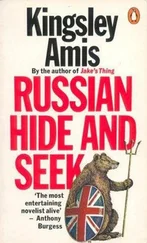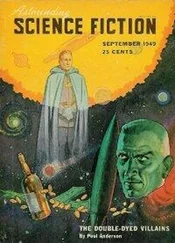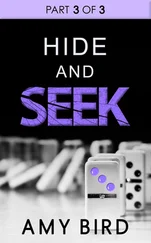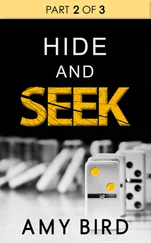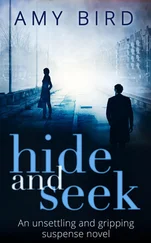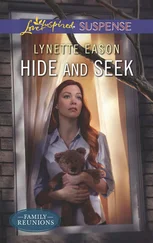Уилки Коллинз - Hide and Seek
Здесь есть возможность читать онлайн «Уилки Коллинз - Hide and Seek» весь текст электронной книги совершенно бесплатно (целиком полную версию без сокращений). В некоторых случаях можно слушать аудио, скачать через торрент в формате fb2 и присутствует краткое содержание. Год выпуска: 2005, Жанр: Классическая проза, на английском языке. Описание произведения, (предисловие) а так же отзывы посетителей доступны на портале библиотеки ЛибКат.
- Название:Hide and Seek
- Автор:
- Жанр:
- Год:2005
- ISBN:нет данных
- Рейтинг книги:5 / 5. Голосов: 1
-
Избранное:Добавить в избранное
- Отзывы:
-
Ваша оценка:
- 100
- 1
- 2
- 3
- 4
- 5
Hide and Seek: краткое содержание, описание и аннотация
Предлагаем к чтению аннотацию, описание, краткое содержание или предисловие (зависит от того, что написал сам автор книги «Hide and Seek»). Если вы не нашли необходимую информацию о книге — напишите в комментариях, мы постараемся отыскать её.
Hide and Seek — читать онлайн бесплатно полную книгу (весь текст) целиком
Ниже представлен текст книги, разбитый по страницам. Система сохранения места последней прочитанной страницы, позволяет с удобством читать онлайн бесплатно книгу «Hide and Seek», без необходимости каждый раз заново искать на чём Вы остановились. Поставьте закладку, и сможете в любой момент перейти на страницу, на которой закончили чтение.
Интервал:
Закладка:
Such was the interior condition of the painting-room, after the owner had inhabited it for a period of little more than two months!
The church-clock of the suburb has just struck ten, when quick, light steps approach the studio door. A gentleman enters—trips gaily over the imitative pen and brush—and, walking up to the fire, begins to warm his back at it, looking about him rather absently, and whistling “Drops of Brandy” in the minor key. This gentleman is Mr. Valentine Blyth.
He looks under forty, but is really a little over fifty. His face is round and rosy, and not marked by a single wrinkle in any part of it. He has large, sparkling black eyes; wears neither whiskers, beard, nor mustache; keeps his thick curly black hair rather too closely cut; and has a briskly-comical kindness of expression in his face, which it is not easy to contemplate for the first time without smiling at him. He is tall and stout, always wears very tight trousers, and generally keeps his wristbands turned up over the cuffs of his coat. All his movements are quick and fidgety. He appears to walk principally on his toes, and seems always on the point of beginning to dance, or jump, or run whenever he moves about, either in or out of doors. When he speaks he has an odd habit of ducking his head suddenly, and looking at the person whom he addresses over his shoulder. These, and other little personal peculiarities of the same undignified nature, all contribute to make him exactly that sort of person whom everybody shakes hands with, and nobody bows to, on a first introduction. Men instinctively choose him to be the recipient of a joke, girls to be the male confidant of all flirtations which they like to talk about, children to be their petitioner for the pardon of a fault, or the reward of a half-holiday. On the other hand, he is decidedly unpopular among that large class of Englishmen, whose only topics of conversation are public nuisances and political abuses; for he resolutely looks at everything on the bright side, and has never read a leading article or a parliamentary debate in his life. In brief, men of business habits think him a fool, and intellectual women with independent views cite him triumphantly as an excellent specimen of the inferior male sex.
Still whistling, Mr. Blyth walks towards an earthen pipkin in one corner of the studio, and takes from it a little china palette which he has neglected to clean since he last used it. Looking round the room for some waste paper, on which he can deposit the half-dried old paint that has been scraped off with the palette knife, Mr. Blyth’s eyes happen to light first on the deal table, and on four or five notes which lie scattered over it.
These he thinks will suit his purpose as well as anything else, so he takes up the notes, but before making use of them, reads their contents over for the second time—partly by way of caution, partly though a dawdling habit, which men of his absent disposition are always too ready to contract. Three of these letters happen to be in the same scrambling, blotted handwriting. They are none of them very long, and are the production of a former acquaintance of the reader’s, who has somewhat altered in height and personal appearance during the course of the last fourteen years. Here is the first of the notes which Valentine is now reading:—
“Dear Blyth,—My father says Theaters are the Devil’s Houses, and I must be home by eleven o’clock. I’m sure I never did anything wrong at a Theater, which I might not have done just the same anywhere else; unless laughing over a good play is one of the national sins he’s always talking about. I can’t stand it much longer, even for my mother’s sake! You are my only friend. I shall come and see you to-morrow, so mind and be at home. How I wish I was an artist! Yours ever, Z. THORPE, JUN.”
Shaking his head and smiling at the same time, Mr. Blyth finishes this letter—drops a perfect puddle of dirty paint and turpentine in the middle, over the words “national sins,” throws the paper into the fire—and goes on to note number two:
“Dear Blyth,—I couldn’t come yesterday, because of another quarrel at home, and my mother crying about it, of course. My father smelt tobacco smoke at morning prayers. It was my coat, which I forgot to air at the fire the night before; and he found it out, and said he wouldn’t have me smoke, because it led to dissipation—but I told him (which is true) that lots of parsons smoked. I wish you visited at our house, and could come and say a word on my side. Dear Blyth, I am perfectly wretched; for I have had all my cigars taken from me; and I am, yours truly, Z. THORPE, JUN.”
A third note is required before the palette can be scraped clean. Mr. Blyth reads the contents rather gravely on this occasion; rapidly plastering his last morsels of waste paint upon the paper as he goes on, until at length it looks as if it had been well peppered with all the colors of the rainbow.
Zack’s third letter of complaint certainly promised serious domestic tribulation for the ruling power at Baregrove Square:—
“Dear Blyth,—I have given in—at least for the present. I told my father about my wanting to be an artist, and about your saying that I had a good notion of drawing, and an eye for a likeness; but I might just as well have talked to one of your easels. He means to make a man of business of me. And here I have been, for the last three weeks, at a Tea Broker’s office in the city, in consequence. They all say it’s a good opening for me, and talk about the respectability of commercial pursuits. I don’t want to be respectable, and I hate commercial pursuits. What is the good of forcing me into a merchant’s office, when I can’t say my Multiplication table? Ask my mother about that: she’ll tell you! Only fancy me going round tea warehouses in filthy Jewish places like St. Mary-Axe, to take samples, with a blue bag to carry them about in; and a dirty junior clerk, who cleans his pen in his hair, to teach me how to fold up parcels! Isn’t it enough to make my blood boil to think of it? I can’t go on, and I won’t go on in this way! Mind you’re at home to-morrow; I’m coming to speak to you about how I’m to begin learning to be an artist. The junior clerk is going to do all my sampling work for me in the morning; and we are to meet in the afternoon, after I have come away from you, at a chop-house; and then go back to the office as if we had been together all day, just as usual. Ever yours, Z. THORPE, JUN.—P. S. My mind’s made up: if the worst comes to the worst, I shall leave home.”
“Oh, dear me! oh, dear! dear me!” says Valentine, mournfully rubbing his palette clean with a bit of rag. “What will it all end in, I wonder. Old Thorpe’s going just the way, with his obstinate severity, to drive Zack to something desperate. Coming here to-morrow, he says?” continues Mr. Blyth, approaching the smallest of the two pictures, placed on easels at opposite extremities of the room. “Coming to-morrow! He never dates his notes; but I suppose, as this one came last night, to-morrow means to-day.”
Saying these words with eyes absently fixed on his picture, Valentine withdraws the sheet stretched over the canvas, and discloses a Classical Landscape of his own composition.
If Mr. Blyth had done nothing else in producing the picture which now confronted him, he had at least achieved one great end of all Classic Art, by reminding nobody of anything simple, familiar, or pleasing to them in nature. In the foreground of his composition, were the three lanky ruined columns, the dancing Bacchantes, the musing philosopher, the mahogany-colored vegetation, and the bosky and branchless trees, with which we have all been familiar, from our youth upwards, in “classical compositions.” Down the middle of the scene ran that wonderful river, which is always rippling with the same regular waves; and always bearing onward the same capsizable galleys, with the same vermilion and blue revelers striking lyres on the deck. On the bank where there was most room for it, appeared our old, old friend, the architectural City, which nobody could possibly live in; and which is composed of nothing but temples, towers, monuments, flights of steps, and bewildering rows of pillars. In the distance, our favorite blue mountains were as blue and as peaky as ever, on Valentine’s canvas; and our generally-approved pale yellow sun was still disfigured by the same attack of aerial jaundice, from which he has suffered ever since classical compositions first forbade him to take refuge from the sight behind a friendly cloud.
Читать дальшеИнтервал:
Закладка:
Похожие книги на «Hide and Seek»
Представляем Вашему вниманию похожие книги на «Hide and Seek» списком для выбора. Мы отобрали схожую по названию и смыслу литературу в надежде предоставить читателям больше вариантов отыскать новые, интересные, ещё непрочитанные произведения.
Обсуждение, отзывы о книге «Hide and Seek» и просто собственные мнения читателей. Оставьте ваши комментарии, напишите, что Вы думаете о произведении, его смысле или главных героях. Укажите что конкретно понравилось, а что нет, и почему Вы так считаете.


